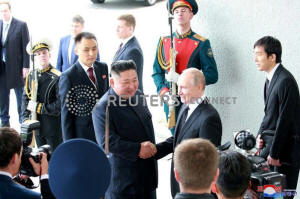|
North Korean leader warns of a return to
tension, blames U.S. 'bad faith'
 Send a link to a friend
Send a link to a friend
 [April 26, 2019]
By Joyce Lee [April 26, 2019]
By Joyce Lee
SEOUL (Reuters) - North Korean leader Kim
Jong Un told Russian President Vladimir Putin peace and security on the
Korean peninsula depended on the United States, warning that a state of
hostility could easily return, North Korean media said on Friday.
Kim's remarks, at talks with Putin in Vladivostok on Thursday, will
likely add to pressure on the United States to be more flexible on a
North Korean demand for an easing of international sanctions.
A second summit between Kim and U.S. President Donald Trump in Vietnam
in February collapsed with no progress on a U.S. demand that the North
give up its nuclear program and a North Korean demand for an easing of
sanctions.
The North Korean leader has said he would wait until the end of the year
for the United States to be more flexible.
"The situation on the Korean peninsula and the region is now at a
standstill and has reached a critical point where it may return to its
original state as the U.S. took a unilateral attitude in bad faith at
the recent second DPRK-U.S. summit talks," North Korea's KCNA reported
Kim as saying.

The Democratic People's Republic of Korea (DPRK) is North Korea's
official name.
"The DPRK will gird itself for every possible situation." KCNA quoted
Kim as saying.
The U.S. State Department did not immediately respond to a request for a
comment.
William Hagerty, the U.S. ambassador to Japan, told a Washington
think-tank that Kimís contact with Russia and China was part of an
effort to seek relief from international sanctions.
"The fact you see Kim Jong Un meeting with Vladimir Putin underscores
the fact that the sanctions are working and the sanctions are putting
extreme economic pressure on the North Korean regime," Hagerty said.
"What we see is an outreach to try to find a way to deal with it. There
is a much simpler way to deal with it and that is to denuclearize," he
said.
He said it was important the international community enforced U.N.
sanctions against North Korea that were imposed because of its nuclear
and missile programs.
SECURITY GUARANTEES
On Friday, Kim joined officials to lay a wreath at a navy memorial at
Vladivostok bay.
The first face-to-face talks between Putin and Kim, held on an island
off the Russian Pacific city, did not appear to yield any major
breakthrough.
[to top of second column]
|

North Korean leader Kim Jong Un shakes hands with Russian President
Vladimir Putin in Vladivostok, Russia in this undated photo released
on April 25, 2019 by North Korea's Central News Agency (KCNA). KCNA
via REUTERS

The two discussed ways to promote strategic communication and
tactical collaboration in the course of ensuring peace and security
on the Korean peninsula and beyond, KCNA said.
Putin said he thought a deal on North Korea's nuclear program was
possible and the way to achieve it was to move forward step by step
to build trust.
But any U.S. security guarantees to North Korea might need to be
supported by other nations involved in previous six-way talks on the
issue, Putin said.
Russia was for years a participant in six-party talks aimed at
persuading North Korea to give up its nuclear program. The talks,
which included the two Koreas, the United States, China and Japan,
have not been held since 2009.
"They only need guarantees about their security. That's it. All of
us together need to think about this," Putin told reporters after
talks with Kim, referring to North Korea.
Such guarantees would have to be international, legally binding, and
vouch for North Korea's sovereignty, Putin said.
Russia and North Korea agreed to increase cooperation in various
areas and Kim invited Putin to visit North Korea, and he accepted,
KCNA said. No date was announced.
"North Korea seems to be trying to expand its negotiating position
with the U.S.," said South Korea's ambassador to the United States,
Cho Yoon-je, according to the Yonhap news agency.
"The U.S. continues to send a message to North Korea through
channels at every level that it is open to dialogue ... The
expectation seems to be that the North may respond once the Chairman
Kim Jong Un's diplomatic schedule is completed."

(Reporting by Joyce Lee; Additional reporting by David Brunnstrom in
WASHINGTON, Hyonhee Shin in SEOUL and Maria Vasilyeva in
VLADIVOSTOK; Editing by Jack Kim, Robert Birsel)
[© 2019 Thomson Reuters. All rights
reserved.]
Copyright 2019 Reuters. All rights reserved. This material may not be published,
broadcast, rewritten or redistributed.
Thompson Reuters is solely responsible for this content. |